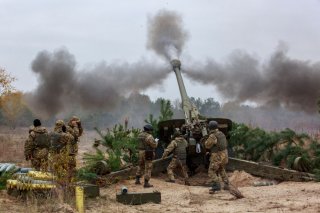“Local” Wars Keep Punishing Global Markets
It is becoming impossible to ignore how seemingly isolated foreign wars create disruptions that ripple through the global economy.
Ukraine’s annual GDP fell by 30 percent in the first year of fighting Russia. Israel's growth projections were adjusted downward by 23 percent in the first month of fighting Hamas. And many other economies—Syria, Myanmar, Ethiopia—bear the lasting scars of longer-term conflict.
But war’s economic damage is not limited to conflict zones. A complete account of war’s costs must include the market shocks felt by global markets, including how conflict undermines economic performance and puts developing countries at risk.
Economists provide a laundry list of reasons why market shocks—defined as sharp, unpredictable fluctuations in trade and investment flows—are toxic at all levels of the marketplace. Shocks can, among other things, inflate budget deficits and destabilize currency values. They can divert trade flows and dampen investment. They can even affect individual incomes through wage suppression and job loss. The harmful effects can be so severe that sustained exposure to instability lowers growth and stunts development.
War worsens these problems. A common misconception is that market shocks come from “acts of God” like natural disasters or pandemics. But political events, including armed conflicts, are far more common causes of day-to-day instability in global markets. There are some straightforward reasons for this. Not least, conflict can interrupt trade and investment relationships by damaging manufacturing infrastructure within countries at war and slowing the production of non-essential goods. For example, a country like Syria, whose economy is heavily focused on agriculture, lost about one-third of its GDP when farming ground to a halt. Similar food security issues have already arisen in Ukraine.
Less directly, but just as importantly, conflict generates political risk. Conflicts motivate multinational firms, who are notoriously sensitive to risk, to divest from unstable economies and reroute supply chains. We see this sensitivity even before violence occurs. Surveys of foreign firms operating in China show businesses grapple with the costs and benefits of exiting an already tense market. Similarly, largely non-event protests in Tahrir Square reversed the upward trend in capital flows Egypt enjoyed before 2011.
Whatever the root causes, the results are often the same: war shocks markets. And the rest of the market feels the ramifications.
War in Ukraine is a prime example. Production slowdowns in Ukraine and Russia, accounting for roughly one-third of total wheat exports, caused global prices to double in 2022. Headlines at the time noted the 50 percent increase in energy prices. Those effects explain why there’s such a strong correlation between political risk and inflation.
Wealthier countries are not immune to the damage. In the United States, inflation, driven in part by war in Eastern Europe, outpaced income growth from 2021 until the summer of 2023, resulting in diminishing purchasing power. In the United Kingdom, energy price hikes associated with the war in Ukraine cost an estimated £1,000 per adult. In the European Union, fuel and food prices pushed inflation up toward 9 percent—more than quadruple the twenty-year average. These numbers all result from how firms and governments struggle to cope with a fast-changing economic climate as political violence continues disrupting long-standing trade and investment partnerships.
Unfortunately, the problem gets multiplied several times over in developing countries. Smaller, poorer economies are especially vulnerable to conflict spillovers because poorer markets are already prone to shocks. Their economic welfare often relies heavily on trade and investment in a relatively narrow set of raw materials and commodities. All of the world’s least diversified economies are also the least developed. That’s because those countries trade mainly in agricultural products, minerals, and low-skilled manufactured goods that already exhibit high price volatility—and doubly so during times of conflict.
This matters for regions like sub-Saharan Africa, where food prices alone increased almost 25 percent in the last three years, putting an estimated 40 million people at risk of hunger. Steel, fertilizer, and other critical goods prices have rocketed up even higher. These countries, where COVID-19 extracted a heavy toll, depend on Ukraine for wheat and Russia for fertilizers, two markets that have become less predictable and less affordable in the last two years.
These economic shocks have clear security implications. Poor economic performance is one of the best predictors of political unrest. Shocks caused by conflicts elsewhere can heighten economic grievance in peaceful economies—and increase the likelihood of political violence. It’s precisely why there are already warnings of spreading conflict in regions still grappling with instability, including recent coups in Niger, Gabon, and Sierra Leone. Countries already facing resource shortages and with prior histories of political instability struggle to manage the added pressure of fickle global markets. It is not too dramatic to say that shocks endanger more lives.
Of course, this close link between economic performance and security is why analysts so often focus mainly on the local damage suffered by war-torn countries. But it’s becoming impossible to ignore how seemingly isolated foreign wars create disruptions that ripple through the global economy. Recognizing that damage doesn’t diminish the immediacy of problems in conflict zones. On the contrary, it means our ledger of war’s costs has to include entries for markets elsewhere. In today’s globalized, “shock-prone” international system, war’s harms reach far beyond the battlefield.
Jeffrey Kucik is an Associate Professor at the University of Arizona and a Global Fellow with the Wahba Institute for Strategic Competition at the Wilson Center.
Image: Shutterstock.com.

